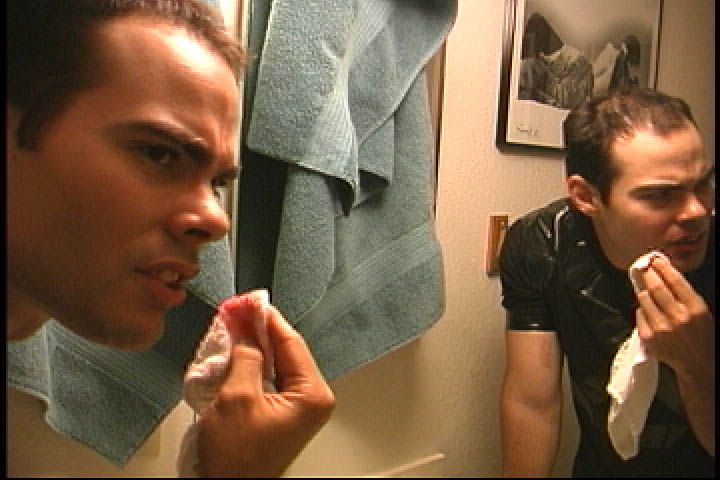

Dante's Arizona is a painstaking work for first-time director Nicholas Holthaus. It's a feature length movie that is at times a crime drama, and at more times an anti-crime-drama. Dante's Arizona is--for those who feel it necessary to draw comparisons--a little bit Falling Down, with a pinch of Fight Club, and it's all set roughly to the plotline, both thematically and quasi-geographically, of Dante's Inferno. It's been joked that the movie is "a merging of the two greatest works in Western literature: Dante's Inferno (1314 C.E.) and, of course, Raising Arizona (1987 C.E.)."
It's a hard movie to nail down, at least in terms of categorization.
The story begins paralleling the opening of Inferno:
The main character, whose name is not given (we'll refer to him here as the Pilgrim), finds himself in a deep depression, so deep that he scarcely leaves his dark bedroom. He's lost everything, including his self-esteem, although he hasn't yet lost his hyperactive mind. The reasons for his depression are more complicated than those offered in typical stories dealing with depressed characters. He's not an alcoholic, he doesn't do drugs; he's not addicted to anything. He hasn't just had a woman dump him. None of these. The problem is much bigger.
He is smart enough to realize he's depressed. He's convinced his depression comes from everything surrounding him, from the shallowly delivered, depressing news stories, to consumer goods failing sooner and sooner due to "planned obsolescence," to empty cultural icons such as the swamp of interchangeable reality shows, contemporary pop music, and peculiar TV shows that display and capitalize on the stunning ignorance of its guests, to the countless corporations who reject him due to his education, experience, and intelligence.
Passive, his locus of control appears to be entirely external. Despite his pain, he lives selflessly. Even though it's not often returned, he derives happiness from helping others, being warm and polite, and, in general, always doing "the right thing." Naturally, when his moral sensibilities become obviously more and more out of place in the ever-increasing alienation and material emphasis of technocommercio-multinationalcorporatecapitalism, something's got to give.
As the Pilgrim is pushed down his path, something strange begins to develop. As he unwittingly falls into more and more dangerous circumstances, he begins to feel more alive than he's ever felt. Yet, at the same time the world he sees gets darker and darker, more confused.
This movie started off as something else. It was initially a rather straight-forward crime drama, and something to sort of throw together in the hopes that it would be a completed, feature length movie that we could show potential investors. With their money, we would be free to make "financed" movies, specifically a dream project Doug Monce and I had regarding Arizona's Lost Dutchman Goldmine legends.
The crime drama came apart due to a number of those usual elements that disintegrate a first-time team effort: too many chiefs (and, critically, not the right ones) and not enough Indians, as well as lack of organization, lack of resources, lack of...etc.
So the crime drama died.
Only to be revived a few months later due to sheer investment of energy and the exorbitant amounts (to me) of money put into what was to be our first project. This revival would create something very different--at times 180 degrees different--from the "boring old film noire" from which it was indirectly born. More on that in another installment.
I had the crew, the cast, the music for the soundtrack and score, just about everything to make another movie. Except the director, and a script.
The latter was a "no-brainer," as perhaps above all else I do on this planet, I'm a writer. The former was going to be the bitch.
But I figured I'm charismatic (enough), I've got some connections, and a whole lot of ambition. Plus, the equipment (well, the camera) was mine, and I got seemingly the whole town of Tempe excited enough in the first place to offer me actors, locations, etc. But most significantly, I'm just DUMB enough to try directing. Plus, I was at the beginning of the road of my unemployability. The stars were aligned; things fell into place, as they do.